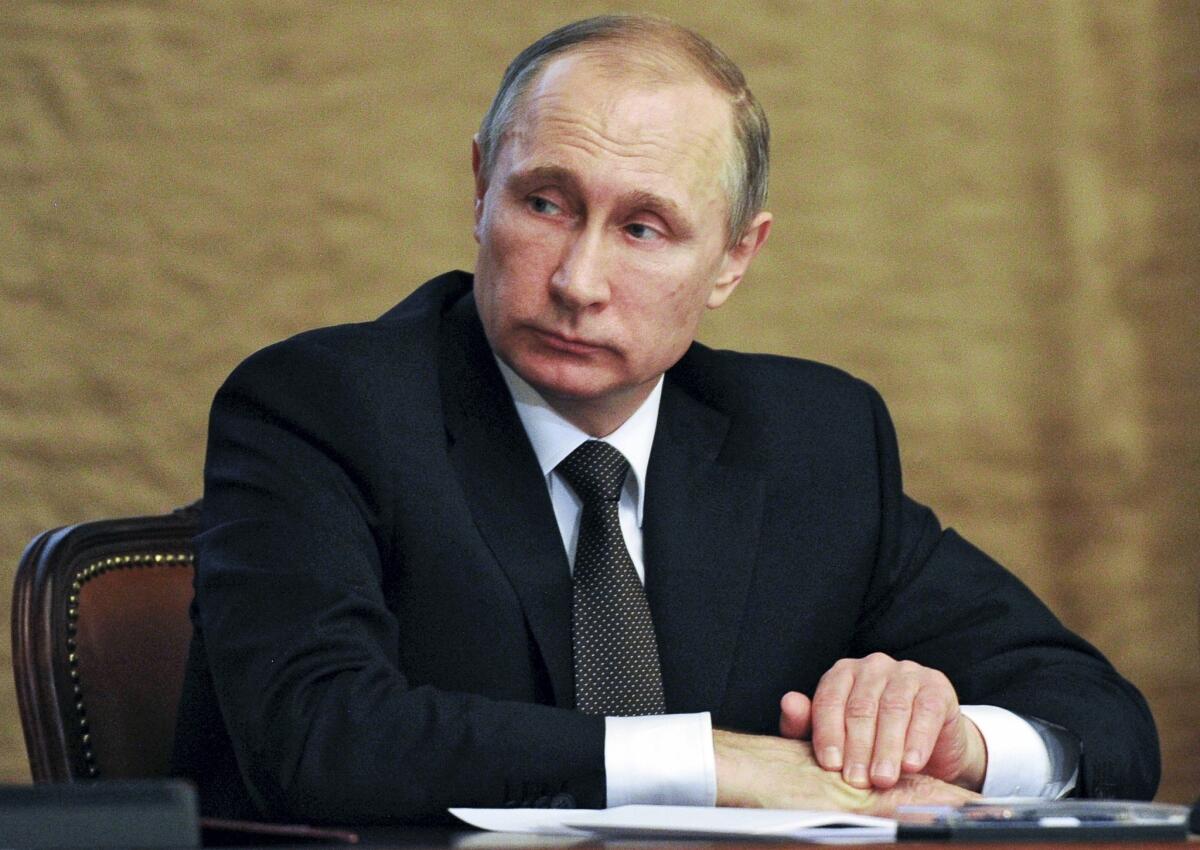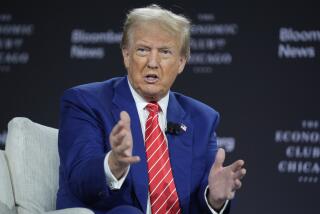In political turnabout, Democrats play soft-on-Russia card by linking Trump to Putin

Reporting from Philadelphia — For decades, Republicans were the fiercest of Cold Warriors, fighting the spread of communism and, not incidentally, winning elections by painting Democrats as the party of the frail and feckless.
Even with the dissolution of the Soviet Union, the GOP and its defense and foreign policy leaders warned against the threat posed by a revanchist Russia.
Four years ago, Republican nominee Mitt Romney portrayed President Obama as too timorous to end the bullying behavior of Vladimir Putin and contain “our No. 1 geopolitical foe.”
But in one of the most startling turnabouts in a campaign filled with role reversals, it is now the Democrats brandishing fear of Moscow as a club, accusing Donald Trump of an oddly worshipful regard for the Russian leader and suggesting that the Kremlin may be interfering in the U.S. election on his behalf.
On Sunday, on the eve of the party’s national convention, Democrats seized on the release of internal emails by the website WikiLeaks to assert that Russia was trying to undermine Hillary Clinton in hopes of boosting Trump’s November prospects.
“Russian state actors broke into the [Democratic National Committee], took all these emails, and now are leaking them,” Robby Mook, Clinton’s campaign manager, said on ABC’s “This Week.”
Mook cited unnamed experts to support his claim, which has only circumstantial evidence as backup: A cyber-security firm hired by the committee reported last month that its computer systems had been hacked by two separate groups with ties, the firm said, to Russian intelligence organizations.
WikiLeaks has not said where it obtained the emails it revealed or whether they were linked to that hacking incident.
“They are pretty desperate pretty quickly,” Paul Manafort, the chairman of Trump’s campaign, told reporters in brushing off Mook’s assertion.
Politically, the allegation served a dual purpose.
Taken together with Trump’s friendly statements about Putin and his strongman persona, his criticism of NATO and the GOP’s decision to abandon platform language critical of Russia’s invasion of Ukraine, it once more yoked the Republican nominee to one of America’s most enduring adversaries.
Trump shocked many in the defense and foreign policy establishment last week when he told the New York Times that, as commander in chief, he would not automatically come to the defense of America’s NATO allies if they were attacked by Russia.
The assurance of all-for-one assistance is a fundamental underpinning of the post-World War II pact between the U.S. and its European allies and has been a bulwark against Russian expansionism in Eastern Europe.
Clinton’s strategists hope such statements will help drive security-conscious Republicans to the presumptive Democratic nominee; she already has gained endorsements from some of the party’s senior national security figures.
Last month, Brent Scowcroft, the top national security advisor to Republican Presidents Gerald Ford and George H.W. Bush, said in a written statement endorsing Clinton that “she brings deep expertise in international affairs and a sophisticated understanding of the world.”
On Sunday, Manafort swatted back at suggestions Trump is too cozy with Putin.
“It’s absurd,” Manafort said on ABC’s “This Week.” “There’s no basis for it.”
Manafort, a longtime Washington insider, has his own controversial ties to Russia, having worked as a political consultant for a pro-Russian government in Ukraine.
Raising the prospect of Russian meddling in the election also served the added benefit, from Clinton’s perspective, of distracting from internal party divisions over the emails, which showed strategists at the Democratic National Committee plotting to undermine her rival, Bernie Sanders, in the party’s nominating fight.
On Sunday, Sanders called for the resignation of party chair Debbie Wasserman Schultz, and by day’s end she had announced that she was quitting at the end of the week.
As thousands of Democrats poured into this hot and steamy convention city, with its rich colonial history and modern-day urban blight, party leaders previewed the case they hope to make over the next four days, portraying Trump as too risky and reckless to trust with the nation’s care.
Lending his hand, President Obama hit Trump on another foreign policy front, warning on CBS’ “Face the Nation” that the Republican’s approach to fighting the Islamic State militants would only strengthen the terrorist group and divide Americans.
“The kinds of rhetoric that we’ve heard too often, from Mr. Trump and others, is ultimately helping do ISIL’s work for us,” Obama said, using an acronym for Islamic State.
In addition to the GOP nominee’s proposal to ban Muslims from entering the country, Obama said Trump’s recent threat to curtail the U.S. involvement in the North Atlantic Treaty Organization was further “indication of the lack of preparedness” to oversee the country’s relationship with the world.
Trump has been further undercut by those in his own party who remain nominally supportive but have called into question his foreign policy judgment and political capabilities.
Senate Majority Leader Mitch McConnell of Kentucky, who gave a less-then-rousing speech in support of Trump at the Republican convention, called his remarks on NATO a “rookie mistake” and suggested a need for seasoned supervision.
Trump fired back on Sunday.
“He’s 100% wrong. OK?” Trump said on NBC’s “Meet the Press.”
“Frankly it’s sad,” the GOP nominee went on. “We have NATO, and we have many countries that aren’t paying for what they’re supposed to be paying, which is already too little, but they’re not paying anyway. And we’re giving them a free ride or giving them a ride where they owe us tremendous amounts of money.”
Such criticisms of NATO and U.S. alliances tap into an abiding suspicion, at least among Trump’s supporters, of foreigners and foreign entanglements that run deep.
But his open admiration for the Kremlin’s authoritarian leader, regarded by many as a serious threat to both Russia’s neighbors and U.S. interests, carries no small amount of risk.
By tapping concerns about Putin’s expansionist aims and accusing Trump of complicity, the Clinton campaign is raising some ghosts of the old Cold War — and hoping this time it will be the Democrats who can capitalize on voter fears.
Twitter: For more political news and analysis follow me @markzbarabak
ALSO
Hillary Clinton has all kinds of policies — that’s the problem as she seeks a coherent message
Donald Trump brags about bringing in voters. He doesn’t mention the ones he might be chasing away
More to Read
Get the L.A. Times Politics newsletter
Deeply reported insights into legislation, politics and policy from Sacramento, Washington and beyond. In your inbox three times per week.
You may occasionally receive promotional content from the Los Angeles Times.











